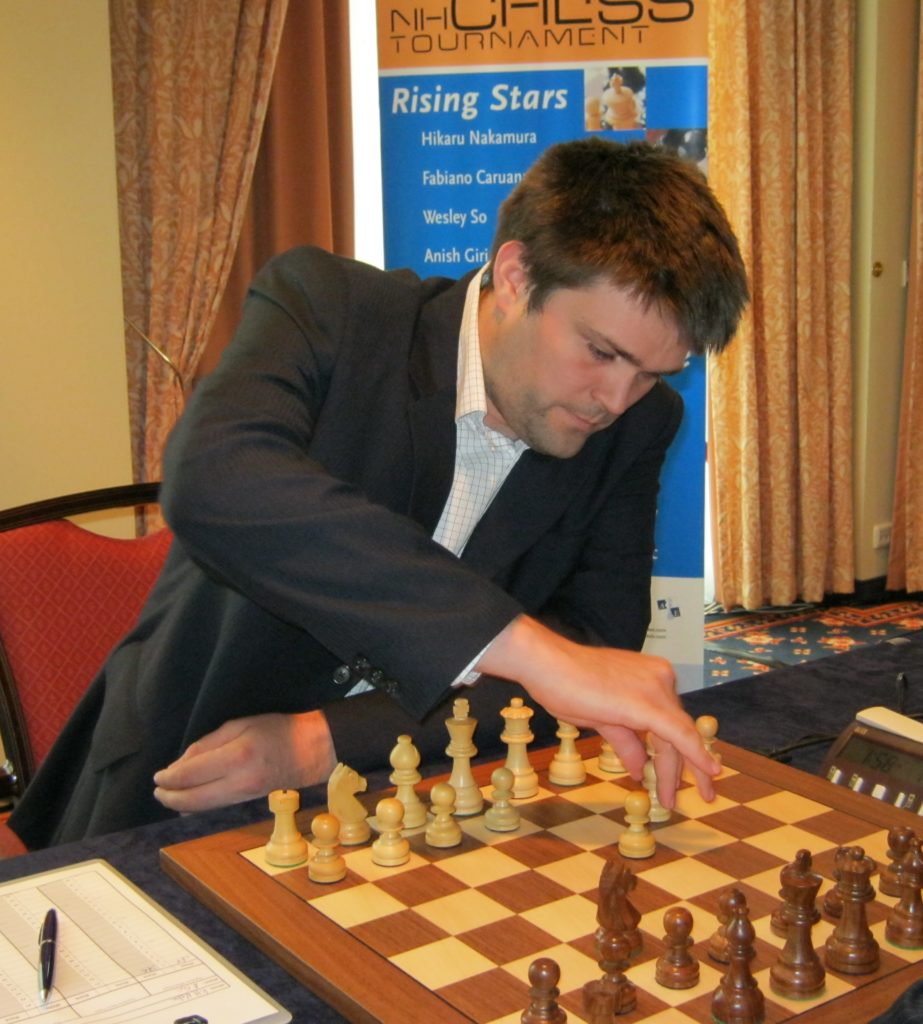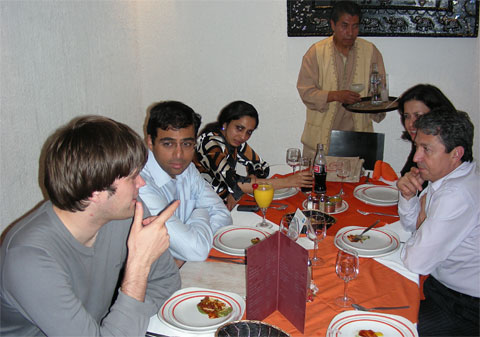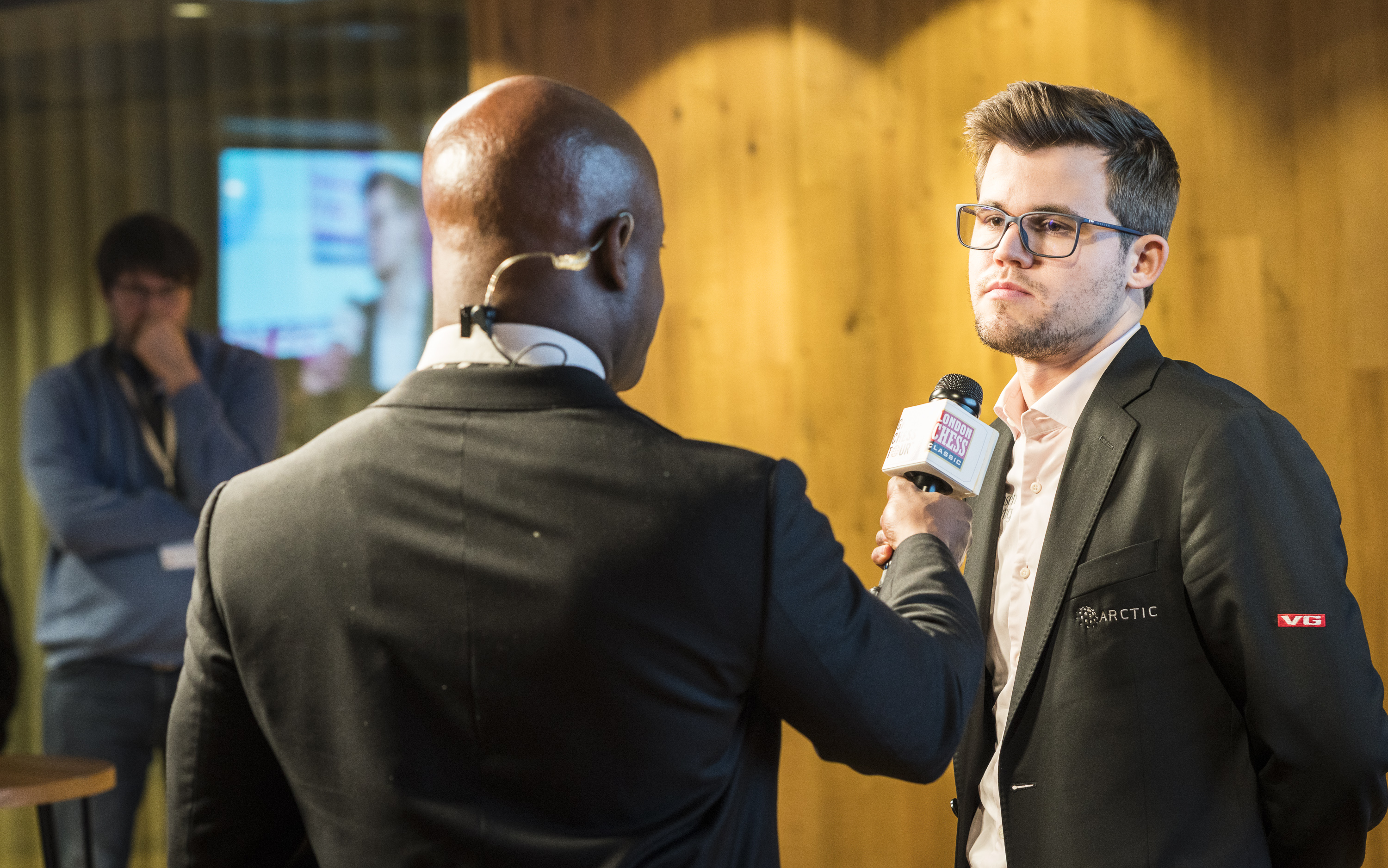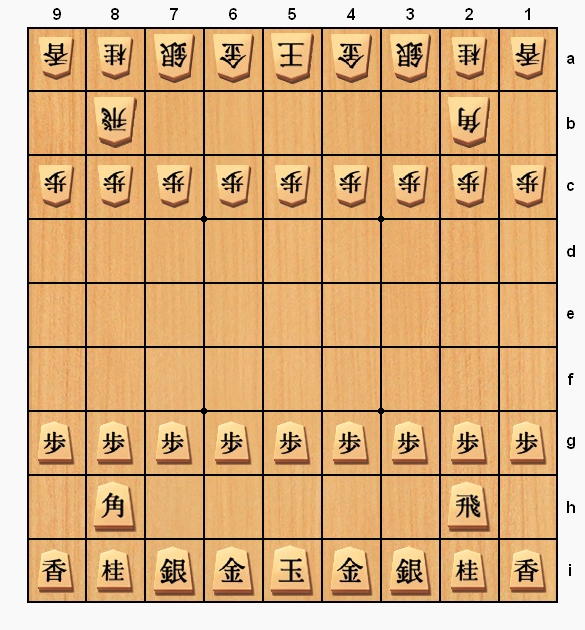Danish GM Peter Heine Nielsen has carved a name for himself as the most successful second of modern times. An expert theoretician, he was part of Anand’s team for ten years, helping him to four consecutive World Championship titles in the process. In the last few years, Nielsen has been Carlsen’s second and has guided him to a couple of World Championship titles as well. While today Nielsen is mainly involved in seconding Carlsen, he also boasts of an illustrious chess playing career. He reached the prestigious 2700 landmark in 2010 and is the first and only Danish player to have achieved this feat.
In the following interview, Nielsen sheds light on the job of a second, explaining the all-pervasive role a second plays. He shares his experiences of working with Anand and Carlsen, while also reminiscing his first interaction with a young Carlsen who answered every question posed but was eventually more focused on eating Nielsen’s pizza! Finally, Nielsen talks about the game of Shogi, his new-found love. Read on to know more about the ‘big Dane’!

Shubham Kumthekar: You are one of the most successful seconds around in world chess. How do you feel about it and what can you tell us about it?
Peter Heine Nielsen: I feel very lucky to have worked with two of the biggest chess talents in the world, who as well as being true champions, are kind and interesting persons as well. At the age of thirty, I would have never guessed that my life would have such opportunities, but the last 14 years have indeed been an interesting and unexpected adventure.
How do you approach seconding?
I started working for Anand and Carlsen when they, at the respective times, were already the best players in the world. It obviously meant they did something right. As such, my role has always been to support the direction they wanted to go in. There is a major difference between being a football coach, for instance, where you are dictating the strategy, and coaching in an individual sport, where the player himself is the one in charge.
Apart from helping with the actual chess, what role does a full-time second play in a player’s success?
Our role is to be supportive, and generally, you also see the players and their seconds sharing a strong friendly relationship. Being supportive is crucial apart from providing concrete preparation. Such support can range from discussing psychological elements to helping the player distract himself from the chess events by going bowling or by playing basketball. It is a second’s role to do his best in helping a player get ready for the next game in every sense.

You worked with Vishy for a good 10 years, winning four World Championships! Which of these victories was the most challenging of the lot?
All of them were memorable! But clearly, the match with Gelfand went wrong in many ways. For a start, we overprepared by working three months straight and practically not managing to use any of it in the match. On the verge of collapse, Vishy managed to raise his game, and we seconds found some interesting ideas when it mattered. Now, it feels like good memories! But at that time, it was obviously very shaky.
One event that absolutely stands out from your ‘Anand days’ is team Anand’s 40-hour ride to Sofia. Can you share some memories of this interesting incident?
It is my best team-building experience ever! We had great fun using a magnet chessboard and my tablet computer to go through some Catalans, and without engines, we started looking at some new concepts that were even used heavily in the match. As it was a rather long trip, we also found space for the Lord of the Rings trilogy. Of course, the trip was tiring, and we lacked the necessary time to settle in at the venue. Even so, it was easily outweighed by raising our spirits and by bonding as a team.

Let us talk about Magnus. You have worked with Magnus since he was very young. How did you first meet him?
I saw him at a tournament in Gausdal. But the first time we spoke was at a junior camp in Oslo. I was responsible for teaching the older group but had about an hour with the youngsters, including Carlsen and Hammer. Magnus was basically answering any question posed, and at the lunch-break, he was somewhat annoyed that I had no extra material ready and seemed more focused on eating my pizza instead. Which led to my first general impression of Magnus – a very talented and a very curious kid.
Magnus approaches openings in a unique, fresh way. How do you contribute to it?
Well, as stated earlier, my role is to support his approach. I might tell him that my computer does not seem to approve (an idea), but we try to be positive and support his creativity.

What, in your opinion, is Magnus’ mantra to success?
I think Magnus is successful because he is clearly the best player! Of course, he does a lot of things right as well and has a great support team. But at the core of it all are his unique chess skills.
Talking about aspiring players, how can a developing player make the best use of the engines and related tools to improve his game?
I am not sure I have the right to speak on this one. I have worked with two players, who were already number one when I started. Of course, I have some thoughts, but they are not really based on experience. I used to be one of those who pushed the computer to the limits and squeezed out as much value as possible in the opening phase, but these days I also seem to recommend understanding things, even some endgames. I guess I am getting old 🙂
You have been playing minimal active chess in the last few years and are mostly involved in seconding. How does it feel – do you ever feel the urge to play more? 🙂
Not the slightest, actually. Apart from, like most others, having fallen out with my federation, I also think working for two great players as Anand and Carlsen makes you understand your own limitations 🙂 And I enjoy following their games much more than my own, and would rather see them play an opening idea than use it myself. Still, what feels the worst is the rather steep decline in my playing skills. It is not at all a pleasant sight looking at one’s games when one has the feeling that the games used to be on a considerably higher level, and now they are not. Like with most players, I do actually believe that focusing on it would lead to considerable improvement. But most likely, we will never know if that is the reality or I am just lying to myself.
How did you come across shogi?
I was introduced to shogi by Jacques-Marie Pineau, a Frenchman living in Tokyo, who is like a bridgehead between chess and shogi in Japan. When I visited Japan in 2013, he organized a chess-shogi session with the legendary Yoshihara Habu, an honour I did not understand the full extent of back then. But then, I got completely fascinated by the game, and I still am.

Just a few weeks ago, I came back from the international shogi festival in Kitakyushu, Japan. I guess my level in shogi is about 1800, which is quite decent by European standards. But the game gives me a lot of pleasure. I follow the opening discussions and big title matches even if it is challenging to do so without reading any Japanese or because of the fact that the games are played at odd hours due to the considerable time-difference. But that is what fans do, I suppose?
I interviewed Tisdall last year, and he seems to enjoy shogi as well. Then, I saw a picture of Pelletier playing it… What, do you think, draws chess players to shogi?
I would actually twist the question and state why people stay away, if okay? There is absolutely no money in Western shogi as the players are so few and the level is so low compared to Japan. So the environment is of enthusiastic hoppy players, who travel Europe at considerable expense to play tournaments. Also, it is hard getting used to dropping from expert to beginner as well as the fact that learning shogi does require getting used to the pieces which are written in Kanji etc. There are a lot of roadblocks, and if you are not determined and dedicated like a month to it or so, you will drop out.
So why are some drawn to shogi at all? Well basically, it is a great game! I will say it is better than chess in many ways – no draw problem, all games are complicated fights, and ultimately, it always comes down to mutual king-hunts. The material is more fluidly valued, and initiative and king-safety are much bigger parameters in shogi than in chess. Also, the journey of learning a game from scratch is very interesting. You start realizing how hard it is, and how many misunderstandings you have to overcome on the way in order to achieve even a decent level. If anything, I now respect my chess understanding much more than I used to! GM Tiger Hillarp Persson, who plays Go, made a very relevant point that it is very useful as a teacher (of a particular game) to learn a new game, and realize how things look from the beginners’ perspective. It is fun to learn new things. In shogi, I feel that my skills are improving, while in chess… it is painful to talk!
Last but not the least, who do you see as Carlsen’s probable challenger in the next World Championship? 🙂
I look forward to knowing who he will be. But till then, I will relax from thinking about it 🙂 I hope MVL will qualify to the candidates (Ed. – In the end, MVL did not qualify) because then, we will really have the top six rated challengers in the Candidates. And then, let the best man win!
Blitzkrieg
Favourite Cuisine…
Being back from Japan recently, I will have to say their food is lovely.
A book that has had a major influence on you…
Bent Larsen’s 50 selected games. I always travelled with the book in my back during my youth. But in general, his overall writings influenced not just me but a whole generation of Danish chess players, which turned out to be the strongest generation we ever had, exactly for that reason. Of non-chess works, I like Thaler and Sunstein’s ‘Nudge’ a lot.
A song both you and Magnus love listening to…
At camps, most often it is the Marseillaise.
If you had a chance to meet a non-chess celebrity of your choice, who would he/she be?
Angela Merkel, I will say.
If not a chess professional, then?
I quite liked the two years I spent studying at university; so probably something in the academic world.